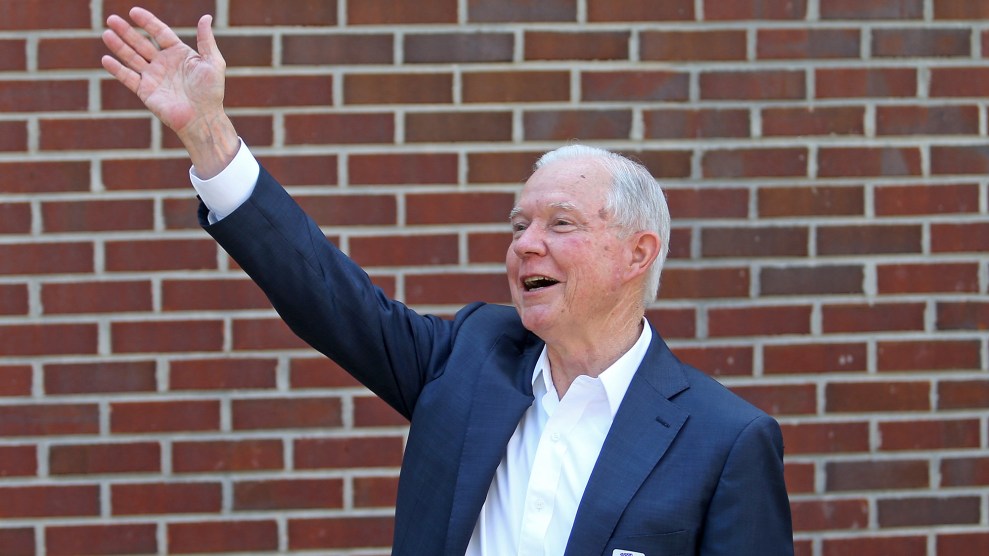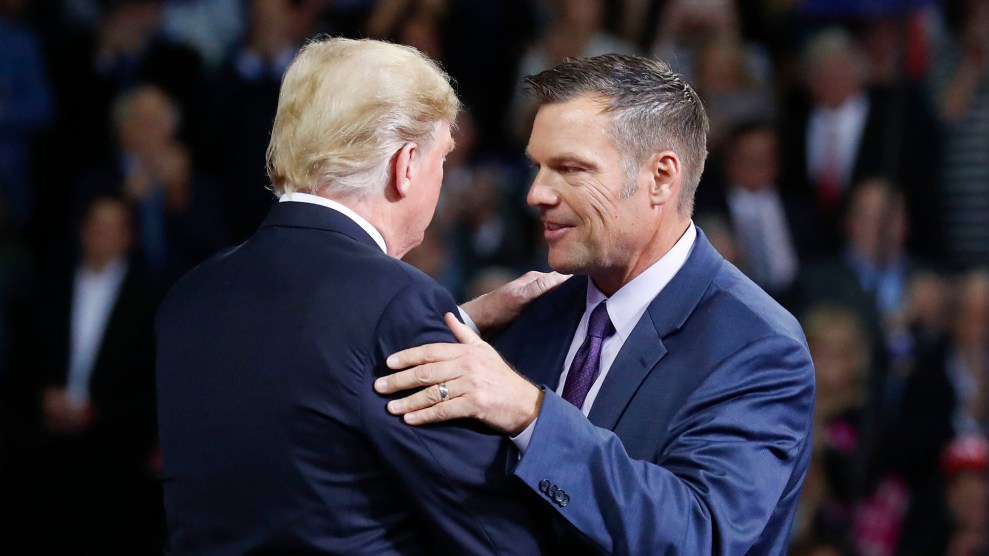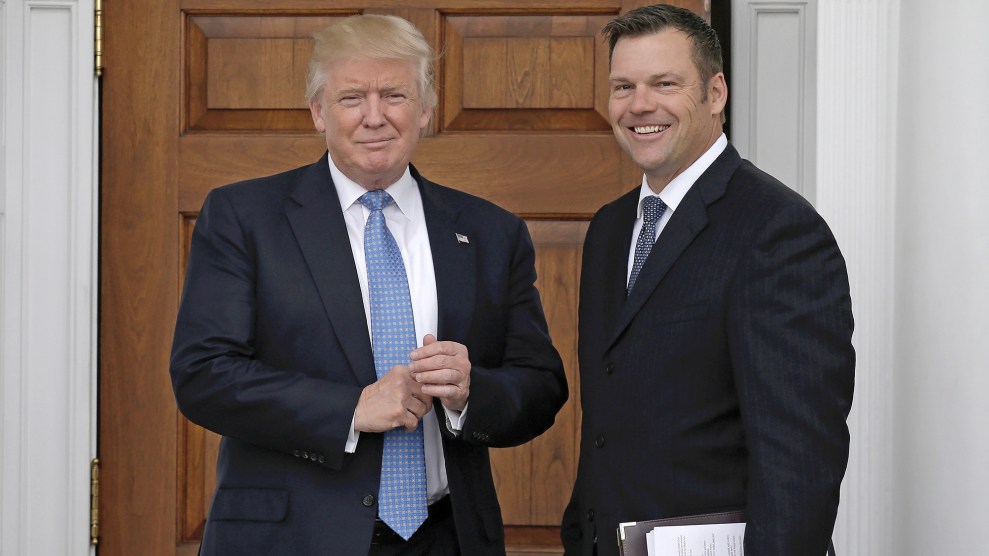
Kris Kobach poses with presidenti-elect Donald Trump at the Trump International Golf Club in Bedminster Township, New Jersey on November 20, 2016.Peter Foley/CNP via ZUMA
Kris Kobach spent the final days of his primary campaign denying that he’s racist. “If I’m a white nationalist, I’m not a very good one,” Kansas’ notorious Republican Senate candidate said at his closing events. In fact, this statement is entirely true. Kobach has the record of a white nationalist, just one who has repeatedly bungled his agenda.
The reason Kobach found himself fending off questions about white nationalism is because his fellow Republicans accused him of having ties to white nationalists in a television ad blanketing Kansas’ airwaves. In a political world that is often sinister, this ad is, like Kobach’s response, an act of political honesty. “Why would Kris Kobach lose again in November?” the ad asks. “Kobach has strong ties to white nationalists.” The message is crystal clear: Kobach will lose to a Democrat in November, so vote against him in the primary.
Kobach shares an agenda with President Trump, one of a small cohort of national figures who can claim to be as anti-immigrant, anti-Muslim, and pro-voter suppression as Trump. And he can boast that he was advocating these policies before Trump fully embraced that agenda. Republicans’ problem with Kobach isn’t necessarily his policies, it’s that in recent years, he’s become a loser. Republicans have openly admitted that they spent money to defeat him in the primary so that they didn’t have to spend even more money to help him win in November.
On Tuesday, those king-making Republicans got their wish. Kobach appears to have lost the primary to a more palatable Republican, Rep. Roger Marshall. The Republicans managed to dodge a bullet, though the Democratic nominee, Barbara Bollier, has proved a formidable candidate despite the state’s conservative leanings. Still, it was no mystery why Democrats preferred to run against Kobach.
In 2018, Kobach won a bruising Republican primary for governor by less than 400 votes, then went on to lose the general election to a Democrat by five points—an impressive loss for a Republican in deeply red Kansas. As a result, national Republicans, including Mitch McConnell, tried everything to keep Kobach off the ballot this November. First they courted Secretary of State Mike Pompeo, a former congressman from Wichita, to run. When that failed, they tried to get Trump to endorse one of Kobach’s opponents. Trump refused. Democrats also keyed onto Kobach’s weakness as a candidate, thinking Bollier would have a better chance against him. A group of Democrats, whose identity is not known, set up a super PAC and began to prop up Kobach’s lackluster campaign in the final weeks of the primary with at least $4 million in television ads. This prompted panic from Republicans, who also believe Kobach could lose to Bollier, who responded with $3.3 million in ads, including the one that painted him as a white nationalist.
Kobach hasn’t always bore the stench of loss, and his successes have harmed untold numbers of immigrants and people of color, as well as many other innocent people caught up in his machinations to enshrine a white ruling class in America. A lawyer educated at Harvard, Yale, and Oxford, Kobach has spent two decades dedicated to keeping nonwhite immigrants out of the United States and stopping people of color and other Democratic-leaning communities from voting. After September 11, he used a perch in the Justice Department to implement an anti-Muslim program in the name of counterterrorism that secured no known convictions on terrorist charges, but did lead to deportation proceedings against 14,000 Muslim men. Kobach has deemed it a “great success.”
He returned to Kansas in 2003, lost a race for Congress, and then spent the rest of the decade doing legal work to create and defend of nativist laws around the country while serving a stint chairing Kansas’s Republican Party. His proto-Trumpism included encouraging local police departments to enforce federal immigration statutes. This led to Kobach’s starring role in crafting SB1070, a notorious 2010 Arizona law that allowed local police to demand immigration papers of anyone they stopped. His national profile rose, and he wrote a similar anti-immigrant law for Alabama.
In 2010, Kobach ran for Kansas secretary of state. “My hope is that Kansas will be to stopping election fraud what Arizona is to stopping illegal immigration,” he declared during his successful campaign. In office, Kobach championed two major voter suppression initiatives. The first was the Interstate Voter Registration Crosscheck Program, or Crosscheck, a database that ostensibly allowed states to compare voter registration files and flag people who may be registered in more than one state. There are successful programs that voting officials use to do this work, but Crosscheck especially excelled at boosting Kobach’s propaganda that voter fraud was undermining American elections while simultaneously helping him disenfranchise eligible voters who were chronically misidentified and removed from the rolls. Researchers at Stanford, Harvard, Yale, and the University of Pennsylvania did a statistical analysis of the program, finding that “200 legitimate voters may be impeded from voting for every double vote stopped.” Kobach managed the program so badly that it had a false positive rate of 99 percent, disproportionately affecting people of color. Kobach’s second major initiative was the Secure and Fair Elections Act, a state bill which required Kansans to show proof of citizenship, such as a passport or birth certificate, in order to register to vote. Again, Kobach claimed the law’s purpose was to prevent voter fraud, but all it did was prevent one in seven new voters from registering.
When Donald Trump became president, he falsely attributed his loss of the popular vote to voter fraud, then tapped Kobach to run a commission to investigate election integrity. The roadmap forward was clear: Kobach would back up the president’s lie, while using his position on the commission to push national voter registration restrictions like he had in Kansas and turn Crosscheck into a nationwide requirement. Republicans had control of the White House and both houses of Congress. Kobach-style voter suppression appeared on the brink of a major national breakthrough.
Instead, Kobach faltered spectacularly as his good luck quickly came to an end. The commission immediately ran into legal trouble for violating federal privacy and transparency laws. When Trump finally disbanded it in January 2018 to put an end to the commission’s legal woes, it faced 15 different lawsuits, including one from one of its own commissioners who had been kept out of the loop by Kobach and his allies.
Back in Kansas, things weren’t going any better. The ACLU was suing to block his proof of citizenship law and Kobach’s defense was going very poorly:
The trial…was supposed to showcase examples of what he claims are widespread voter fraud on the national stage. Instead, Kobach and his team repeatedly failed to follow basic rules of evidence, requiring the judge to lecture him on what she called “Evidence 101.”
In April of 2018, federal judge Julie Robinson held Kobach in contempt of court for failing to follow a court order to register Kansas voters. Two months later, she ruled that the proof of citizenship requirement violated both federal law and the US Constitution. She also ordered Kobach to take six hours of continuing legal education on how to introduce evidence at trial.
Meanwhile, states began to pull out of the Crosscheck program, which Kobach had only recently hoped would become national, over bad data. Privacy concerns led to a Department of Homeland Security audit and a class action lawsuit from the ACLU. In 2019, Kobach’s successor as Kansas secretary of state suspended the program indefinitely.
But Kobach wasn’t giving up. Too toxic by now to get a post in the Trump administration—not because Trump had any problem with him but because Senate Republicans might—he launched a bid for governor in 2018. Despite Trump’s endorsement, he came up short against Democrat Laura Kelly, a defeat big enough to sufficiently brand himself a loser. Nevertheless, Kobach decided to run for Senate in 2020.
Some of Kobach’s losing streak can be attributed to hubris. His farcical performance in court against the ACLU could have been avoided if he had not chosen to represent the law himself, a disastrous decision compounded by his failure to study up on how to conduct oneself during a trial. Given the chance to make voting more difficult for people of color on a national scale as the head of Trump’s voter integrity commission, he instead led it into oblivion by failing to follow basic federal privacy and transparency requirements. His failure to become governor in 2018 was in part attributable to a lazy campaign in which he reportedly refused to raise money or implement a basic get-out-the-vote program, relying instead on Trump’s endorsement and his frequent appearances on cable news. One GOP operative told the Kansas City Star that Kobach’s gubernatorial campaign “was the most dysfunctional thing I’ve ever seen in my life.”
Kobach had transformed himself from the country’s most formidable racist into a buffoon, but his presence in American politics is no laughing matter. Kobach’s losing streak is also a function of his radical agenda, which is so extreme that it is often in violation of federal laws and the Constitution. The Supreme Court struck down significant portions of Arizona’s SB1070 and refused to resurrect the law it inspired in Alabama. But a Supreme Court full of Trump appointees might view things differently today. Yes, there was his embarrassing performance as a trial lawyer, but Kobach failed to defend his own voter suppression law in Kansas because it, too, was unconstitutional. A better lawyer, under a different judge, might have prevailed.
The longer Kobach, Trump, and their allies push their white nationalist agenda, the more the bulwark of federal laws and Constitutional principles blocking their path will crumble. The courts pushed back against the president’s first blunt attempts to ban immigrants from Muslim countries, but the Supreme Court allowed the third, sanitzed version of Trump’s travel ban to take effect. If the Trump administration had been more sophisticated, and hadn’t tried to sabotage the 2020 census in a fashion truly reminiscent of Kobach’s own ineptitude, the Supreme Court would have allowed it. Again and again, hubristic stumbles have thwarted the worst of Kobach and Trump’s goals. But their stupidity won’t undercut them forever.
The Democrats who elevated Kobach in the hopes of winning a Senate seat in Kansas played with fire. Losers are dangerous, too. They can always become winners again. Trump was a national laughing stock with a record of running businesses into the ground when he became president. Democrats who prayed for Trump to win the Republican nomination in 2016 thinking it would benefit Hillary Clinton should have by now learned a valuable lesson: Elevating authoritarian white nationalists can backfire. By Republicans’ own admittance, they don’t have a problem with a racist agenda as long as it wins votes. Kobach’s ideas, particularly in the era of disinformation and polarization, catch fire. Take Jeff Sessions, who was a backbencher in the Senate for 20 years but still managed to kill multiple bipartisan immigration bills and nurtured aides like Stephen Miller before Trump elevated him to attorney general, to devastating effect.
Some Democrats may wish that Kobach had prevailed, boosting their own chances of winning a long-shot Senate seat. But they should be thankful that a dangerous demagogue will not become a senator any time soon. Losers are only losers until they’re not.













